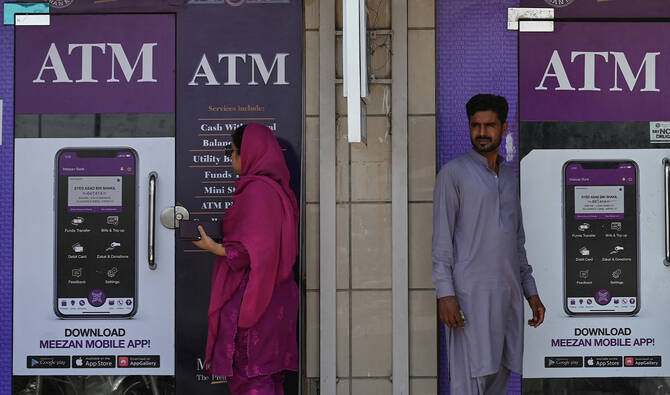KARACHI: Pakistan’s government failed to achieve a target set by the central bank to increase the share of Islamic banking deposits in the country by 50% by January this year, according to official documents seen by Arab News, as Islamabad attempts to rid the country’s banking system of interest.
Pakistan’s Federal Shariat Court (FSC) directed the government in April 2022 to eliminate interest by 2027, maintaining that Islam prohibited it in all its forms and manifestations. The FSC determines whether Pakistani laws comply with Islamic law or not.
Following the order, the government and State Bank of Pakistan (SBP) have taken measures ranging from changing laws in October 2024 to issuing Sukuk (Islamic bonds) to replace interest-based treasury bills and investment bonds.
According to a presentation shared by the SBP with bankers in August 2024, a copy of which Arab News has seen, the central bank set an “indicative target” for the government to increase the share of Islamic banking deposits to 50% by January 2025, 65% by January 2026, 80% by January 2027 and 100% by December 2027.
Pakistan, however, missed this target and was able to increase the market share of its Shariah-compliant banking deposits to only 24.9% by December 2024, the document stated. Noor Ahmed, the chief spokesperson of the SBP, did not respond to Arab News’ request for comments.
“The SBP and the Securities and Exchange Commission of Pakistan are making a lot of efforts but the government should do more to speed up this process of conversion,” Ahmed Ali Siddiqui, the head of Shariah-compliance at Meezan Bank Ltd., told Arab News.
Meezan Bank is Pakistan’s largest Islamic bank which operates more than 1,000 branches in over 300 cities across the country. Pakistan has six full-fledged Islamic banks and 16 conventional banks that also offer Islamic products.
INTEREST-FREE BANKING ON THE RISE
The demand for interest-free banking, however, is increasing in the country.
This increasing demand is reflected in the over 20% growth of annual deposits that Islamic banks have been reporting in recent years, with their total assets swelling beyond Rs10 trillion ($35.6 billion) for the first time, said the SBP’s Quarterly Islamic Banking Bulletin from October to December 2024.
Total deposits of Islamic banks grew by 17% to Rs 7.91 trillion ($28.2 billion), which accounts for 25% of the total banking industry, the bulletin said. Islamic banks extended Rs 4.04 trillion ($14.4 billion) of financing to borrowers, while their investments totaled Rs 4.99 trillion ($17.8 billion).
“The steady rise in assets, deposits, financing, and investment highlights the sector’s resilience,” the central bank said in the report.
Both conventional and Islamic banks are expanding their branches across Pakistan. This led to a 21% year-on-year growth in the number of branches of Islamic banks to 6,017 and a 17% hike in conventional banks operating Islamic banking windows to 2,253.
“This expansion underpins the increasing accessibility and demand for Islamic banking services across the country,” the SBP said in the bulletin.
Pakistan’s leading banks are converting their branches into Shariah-compliant to align with the legal requirement for all banks to transition to Islamic banking by 2027.
In November, MCB Bank Ltd. converted 39 of its conventional branches into interest-free ones while the United Bank Ltd. has also converted all its branches located in the northwestern Khyber Pakhtunkhwa and southwest Balochistan provinces into interest-free ones.
“The government’s biggest challenge is to convert all its loans and financing into Islamic financing,” Siddiqui said.
He urged the government to take all its deposits to Islamic banks and convert its treasury bills and investment bonds into Sukuk as a first step.
“You should at least announce the conversion of National Bank Pakistan [into a Shariah-compliant bank], which is the state-owned bank,” Siddiqui said.
The banker said the government could speed up the process of conversion if all its institutions could carry out their transactions such as salaries and pension funds through Islamic banking.
















